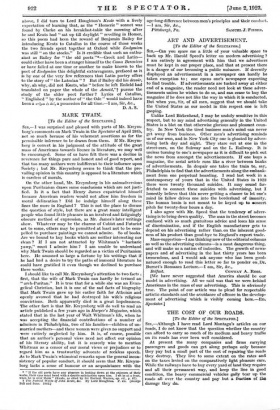ART AND ADVERTISEMENT.
[To the Editor of the SpEeTaTort.] Sm„—Can you spare me a little of your valuable space to back up Mr. Harold Speed's letter on modern advertising ? I am entirely in agreement with him that we advertisers .must be kept in our proper place, and that at present there is a danger of our becoming a public nuisance. If decently displayed an advertisement in a newspaper can hardly be taken exception to ; one opens one's newspaper expecting to find trouble. If advertisements are tucked away at either end of a magazine, the reader need not look at these adver- tisements unless he wishes to do so, and can cease to buy the magazine if he does not like the way in which it is conducted. But when you, Sir, of all men, suggest that we should take the United States as our model in this respect one is left flasPing.
Unlike Lord Birkenhead, I may be unduly sensitive in this respect, but to my mind advertising generally in the United States is a blot on that otherwise glorious and pleasant coun-
try. In New York the tired business man's mind can never get away from business. Other men's advertising reminds us of our own, and in New York City one is ghosted by adver- tising both day and night. They stare out at one in the street-cars, on the Subway and on the L. Railway. It is useless turning to one's newspaper as it is difficult to pick out the news from amongst the advertisements. If one buys a magazine, the serial article runs like a river between banks of advertisements. In despair one takes the train to, say, Philadelphia to find that the.advertisements along the embank- ment form one perpetual hoarding. I read last week in a :contemporary of yours that in the United States in 1922 there were twenty thousand suicides. It may sound far- fetched to connect these suicides with advertising, but I honestly believe that this never getting a chance to let one's mind lie fallow drives one into the borderland of insanity. The human brain is not meant to be keyed up to concert pitch for twenty-four hours a day.
I also agree with Mr. Speed that the tendency of adver- tising is to bring down quality. The man in the street becomes confused with so much gratuitous advice and loses his sense of discrimination, and if the English manufacturer gets to depend on his advertising rather than.on the inherent good- ness of his product then good-bye to. England's export trade.
Mass-suggestion—I am thinking now of the editorial columns as well as the advertising columns—is a most dangerous thing, and will make us a nation of imbeciles. The growth' of news- papers and of advertising in the last thirty years has been tremendous, and I would ask anyone who has been good- natured enough to read this letter so far to ponder on ,Dr. Burnet's Romanes Lecture.—I am, Sir, &c., [We have never suggested that America should be our model in advertising. All we said was that we were, behind Americans in the mass of our advertising. This is obviously true. The point of our article was to plead for respectable artistic standards and the avoidance of offence in the develop- ment of advertising which is visibly coming here.—En. Spectator.]










































 Previous page
Previous page